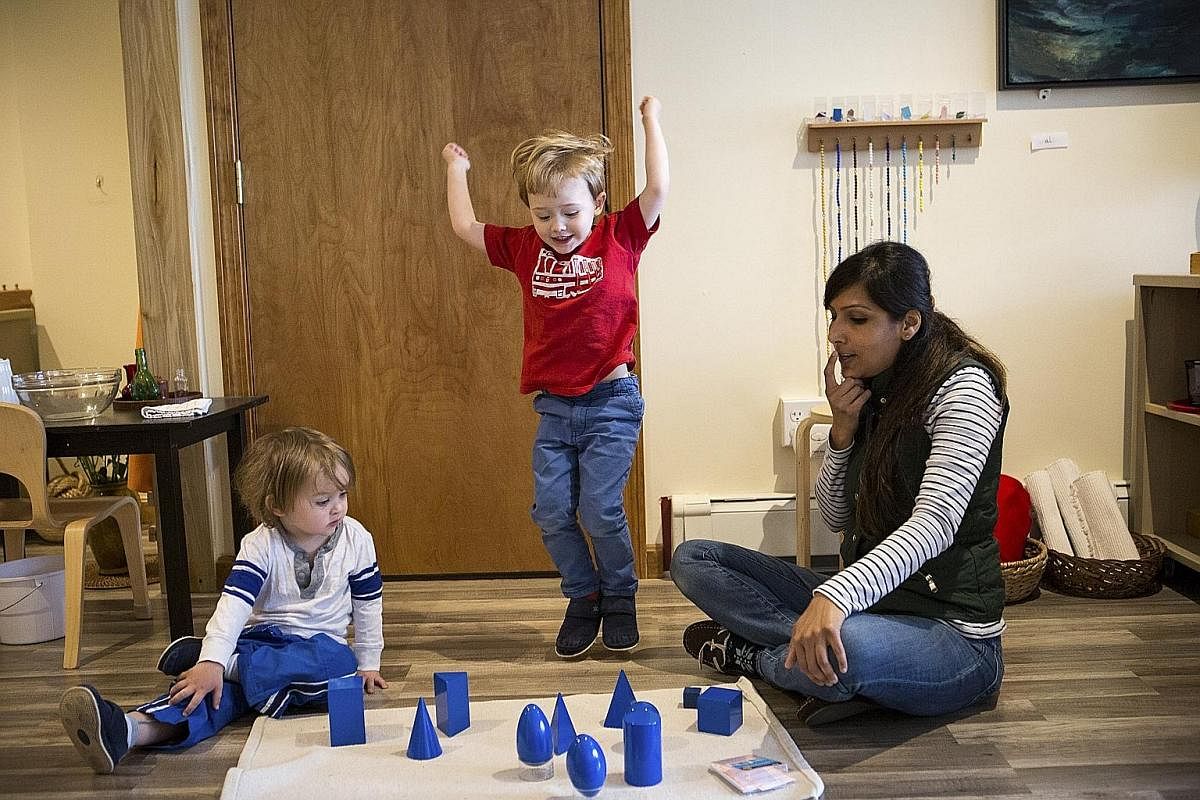Start maths at age three?

NEW YORK • A group of students at Woodside Community School in Queens, New York, peer up at their teacher as she uses an overhead projector to display a shape.
It looks like a basic geometry lesson in any classroom, except for the audience. They are pre-schoolers.
How can you tell it is a square, the teacher asks. A boy raises his hand, having remembered these concepts from a previous lesson.
"A square has four angles and four equal sides," he says.
As reformers in the United States push to expand publicly funded pre-kindergarten programmes, more kids are being exposed earlier to mathematics and phonics lessons.
That has worried some education experts and parents, who believe that children of that age should be playing with blocks, not sitting still as a teacher explains shapes.
But a new national study suggests that pre-schools that do not mix enough fibre into their curriculum may be doing a disservice.
The study found that by the end of kindergarten, children with a year of "academic-oriented pre-school" outperformed peers at less academic- focused pre-schools by, on average, 21/2 months of learning in literacy and mathematics.
Mr Bruce Fuller is the lead author of the study by researchers at the University of California, Berkeley.
"If you can combine creative play with rich language, formal conversations and mathematics concepts, that's more likely to yield the cognitive gains we observed," he said.
The study comes amid rapid expansions of taxpayer-funded pre-school initiatives in cities such as Washington and San Antonio.
New York mayor Bill de Blasio has said that he would expand the programme, open to all four-year-olds, to three-year-olds.
The new wave of pre-schools provides playtime, but these schools' major goal is academic "kindergarten readiness" and the study could provide ammunition for policy-makers who want to keep on that course.
Whether they will win over all parents is another question.
Many who are college-educated are wary of academic pre-school, worrying it will quash the love of learning before their children make it past their holding-hand years.
Some child development experts question whether the goal of the new pre-K - putting all children on a path to read and do simple mathematics problems by the end of kindergarten - is appropriate and whether it might detract from the socialisation value that pre-schools have been known for.
Many children "are not ready to do that without being put under a lot of stress and strain", said Ms Joan Almon, an expert on play-based education with the Alliance for Childhood, an advocacy group.
Aware of the concern, the Berkeley study, published in the Journal of Applied Developmental Psychology, assessed the children's behaviour based on interviews with their parents.
It found that the kids did not seem to be hurt socially or emotionally by attending the more academic programmes.
Mr Robert Pianta, dean of the Curry School of Education at the University of Virginia, said the research confirmed smaller-scale studies from Oklahoma and Boston, showing that academic pre-kindergarten benefited both poor and middle-class children.
Nevertheless, the study had limitations. It followed children for a relatively short period and remained unclear if the benefits would extend beyond kindergarten.
Previous research has shown a disappointing "fade-out" effect, in which early academic gains are lost over time, making it harder to fulfil one of the main objectives of publicly funded pre-school - closing the achievement gap between poor and middle-class students.
In Montessori schools, which occupy more of a middle ground, children are allowed to spend long stretches of the day in freely chosen activities, such as painting or sorting colourful beads.
Teachers generally do not lecture, but impart academic concepts, such as how to sound out words, by inviting children to participate in one- on-one or small group lessons.
Mr Fuller said a carefully constructed Montessori classroom could certainly encompass the effective teaching practices his study identified.
"I see it as emulating good parenting. We're not heavily didactic and totally directive, but we are introducing new knowledge and rich language," he added.
NYTIMES
Join ST's Telegram channel and get the latest breaking news delivered to you.
A version of this article appeared in the print edition of The Sunday Times on June 25, 2017, with the headline Start maths at age three?. Subscribe
